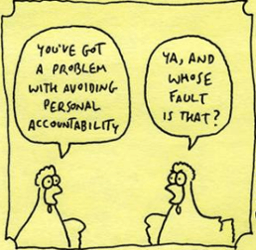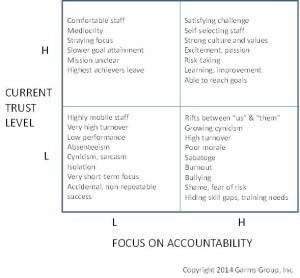Put Accountability in Its Proper Place!
A client hired me to help shift her organizational culture from one rife with fear, threat, competition, and cynicism to one of respect, trust, and faith in leadership. Over the past year, this organization has built a campaign around “accountability” alongside a large-scale process improvement initiative. Still struggling to grow consistent strong performance, and engaged staff, they are looking for answers to explain why the progress is not more evident, or faster. In my view, part of the fundamental problem lies in how they (and many of us) are defining and seeking accountability.
“We are using increasing accountability as a tactic for gaining success, when increased accountability ought to be one of the outputs of a successful workplace.”

“Holding accountable” has become a euphemism. Can you think of an organization that you have worked for or consulted with, where you never once heard anyone say, “We need to hold people accountable . . . “? I can’t. I do not think that the phrase accurately describes the need the speaker was identifying, however. This is a phrase we know, so we use it. We may not know how else to describe the cultural problems that need solving. We use the term, “holding people accountable” when we actually mean something else.
“Accountability” in its fullest sense includes: responsibility, transparency, trustworthiness, participation, feedback, and measurement of results. I suspect, though, that most of the time we hear and use this term, we are NOT including all facets of the definition. Instead, we typically refer to simply holding someone responsible for his/her actions.
This narrow definition creates the impression that closer monitoring of employee activity, retribution for inferior performance or lack of follow-through are the keys to a strong and capable workforce. While these behaviors may be necessary for building a strong workforce, they are not sufficient.
Accountability should not be the fix. It should not be the initiative, the leadership mantra, or the training topic. It is instead the result of a sane, respectful, and high-performing workplace through meeting human needs.
As Daniel Pink and David Rock both agree, we need autonomy in our work. We need to feel we have some control about how we do the work we are hired to do. Well-intentioned but misdirected efforts to squeeze more accountability out of staff directly threaten this need. We are innately sensitive to both inequality and status differences. Given this, if staff perceive that something is being demanded of them by their organizational superiors who may not be well-informed about the work staff does, may not be collaborative, encouraging, appropriately challenging, or even respectful, our heightened sensitivity will yield fear, threat, mistrust, and competition. Social connectedness is also critically important to individual and organizational success. Here again, demanding more accountability without first building strong social bonds is a risky proposition, more likely to backfire than to bring success.

Before launching a full-court press on accountability in your organization, look at the likely outcomes of such an effort, given the state of trust that currently exists, and the intensity of the focus on accountability (below).
Moving forward It is quite possible to exert too much pressure on accountability, too soon, to the detriment of reaching your organizational goals. But is it possible to put too great a focus on building trust in the workplace? Is there any danger in focusing on trust-building as a foundation, before launching an accountability campaign? Wouldn’t it be exciting and refreshing to have an organization-wide (interactive!) conversation about just this – the interplay between accountability and trust?
Download the SmartThings List
Tools for Radical Productivity
Stay connected with news and updates!
Join our mailing list to receive the latest news and updates from our team.
Don't worry, your information will not be shared.
We hate SPAM. We will never sell your information, for any reason.

